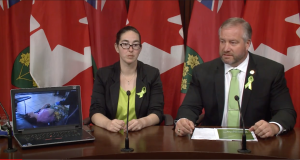May 17, 2018 @ 11:05
Ontario is encouraging people to protect themselves from tick bites and reduce the risk of Lyme disease when spending time outdoors.
Lyme disease is spread through the bite of an infected black-legged tick, which can be found almost anywhere in Ontario. People living in or visiting wooded areas with tall grass and bushes, or moist environments, should take the following precautions:
- Staying on marked trails, where possible
- Wearing long sleeves, pants, socks, and closed shoes
- Tucking pants into socks and wearing light-coloured clothing to make ticks more visible
- Using insect repellent with DEET or icaridin on clothes and exposed skin
- Checking your body thoroughly for ticks after being outdoors — promptly removing ticks can help prevent infection.
Left untreated, Lyme disease can cause serious health problems. An infection can lead to recurring arthritis, neurological problems, numbness, and paralysis. Consult a healthcare professional if you experience any of the following symptoms after a tick bite:
- Skin rash
- Headache
- Fever
- Muscle and joint pain
- Spasms
- Weakness, numbness or tingling
- Generally feeling unwell.
Most cases of Lyme disease can be treated successfully with antibiotics when it is caught early.
Quick Facts
- Approximately 997 cases of Lyme disease were reported in 2017.
- The greatest risk of getting Lyme disease is during the spring and summer months.
- When doing a full body check for ticks, pay close attention to areas such as your scalp, ankles, armpits, groin, naval and behind your ears and knees. Use a mirror to check the back of your body or having someone else check for you.
Additional Resources
“After a long winter, Ontarians are looking forward to being outside and enjoying activities like hiking, gardening or camping. Taking the time to learn about the ways of reducing exposure to tick bites and preventing Lyme disease is an important part of enjoying the outdoors.”, Dr. David Williams, Chief Medical Officer of Health.
SOURCE – Ministry of Health and Long-Term Care
- Une activité d’apprentissage vive en couleurs! - October 24, 2024
- A colourful learning activity! - October 24, 2024
- Transport of Nuclear Waste through Northern Ontario Focus of Whiteshell License Hearing Today - October 23, 2024
 Wawa-news.com You can't hear the 'big picture'!
Wawa-news.com You can't hear the 'big picture'!
